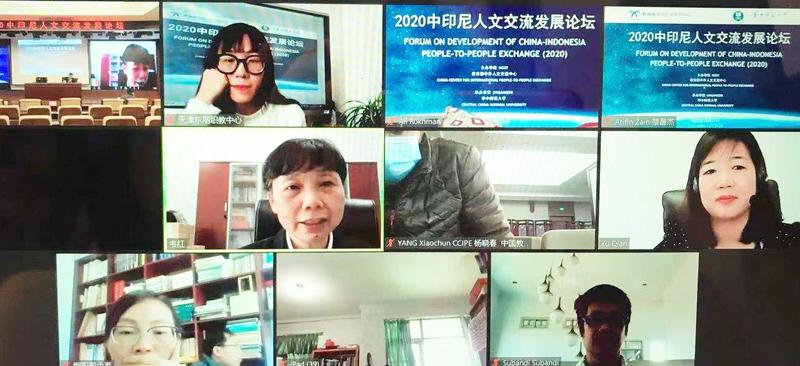 Speakers at the 2020 Forum on Development of China-Indonesia People-to-People Exchange draw thousands of online audience on Nov 13, 2020. (LING MINGSHENG / FOR CHINA DAILY)
Speakers at the 2020 Forum on Development of China-Indonesia People-to-People Exchange draw thousands of online audience on Nov 13, 2020. (LING MINGSHENG / FOR CHINA DAILY)
The COVID-19 pandemic has highlighted the importance of people-to-people and cultural exchanges between China and Indonesia, providing new opportunities for people of both countries, a forum heard.
This year marks the 70th anniversary of the establishment of diplomatic ties between China and Indonesia. It also marks the fifth anniversary of the establishment of the high-level people-to-people exchange mechanism between the two countries
“We are very much looking forward to promoting connections with China and strengthening them through people-to-people exchanges,” said Wikan Sakarinto, director-general of vocational education at Indonesia’s Ministry of Education and Culture, on Nov 13 at the Forum on Development of China-Indonesia People-to-People Exchange.
Recognizing how the two countries have been cooperating in areas such as student exchange, academic visits and research, Wikan said he hopes to further promote people-to-people exchanges between institutions from China and Indonesia, especially in vocational training.
“As the pandemic has become a new normal, countries across the world are facing new opportunities in developing people-to-people and cultural exchanges,” said Peng Shuangjie, vice-president of Central China Normal University (CCNU).
ALSO READ: Xi highlights links to Indonesia, Morocco
CCNU and the Chinese Ministry of Education’s China Center for International People-to-People Exchange (CCIPE) jointly organized the forum. With the theme “China-Indonesia Vocational Education Cooperation in the Post-COVID-19 Period”, the online forum brought together government officials, diplomats, academics, researchers and businesses from China and Indonesia.
This year marks the 70th anniversary of the establishment of diplomatic ties between China and Indonesia. It also marks the fifth anniversary of the establishment of the high-level people-to-people exchange mechanism between the two countries.
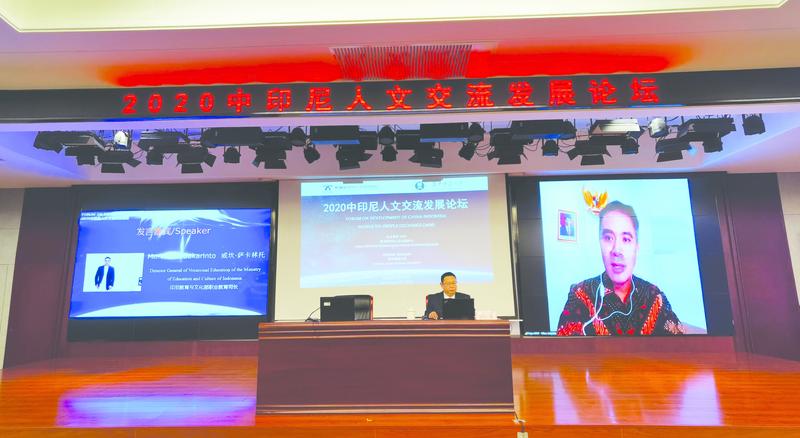 Wikan Sakarinto, director-general of vocational education at Indonesia’s Ministry of Education and Culture, says in his address that they are looking forward to promoting connections with China. (LING MINGSHENG / FOR CHINA DAILY)
Wikan Sakarinto, director-general of vocational education at Indonesia’s Ministry of Education and Culture, says in his address that they are looking forward to promoting connections with China. (LING MINGSHENG / FOR CHINA DAILY)
Noting CCNU has always put an emphasis on exchange with Indonesian universities and institutions, Peng said the university will further promote cooperation between universities from China and Indonesia, with focus on academic research, people-to-people exchange activities and adapting to the new trends in the post-pandemic era.
“During the pandemic, people from China and Indonesia worked together to overcome the difficulties, demonstrating the concept of the community with shared future for mankind,” said Fang Jun, deputy director-general of the Department of International Cooperation and Exchanges at the Chinese Ministry of Education.
Fang said China will firmly promote cooperation and exchanges in the education sector with countries including Indonesia in the post-pandemic era. By enhancing cooperation in vocational education, he hopes China and Indonesia can jointly cultivate the high-quality skilled talent needed in the Fourth Industrial Revolution.
Djauhari Oratmangun, ambassador extraordinary and plenipotentiary of Indonesia in China, said vocational education is an important topic for the Indonesian government.
Noting Indonesia will need to further combine vocational education with industrial development, he said he hopes China and Indonesia can further enhance their cooperation in the sector, which is also one of the basis for bilateral relations.
"The bilateral relations between China and Indonesia go beyond diplomatic links, as it is also embodied by the friendship among their people, which has become increasingly close," said Djauhari.
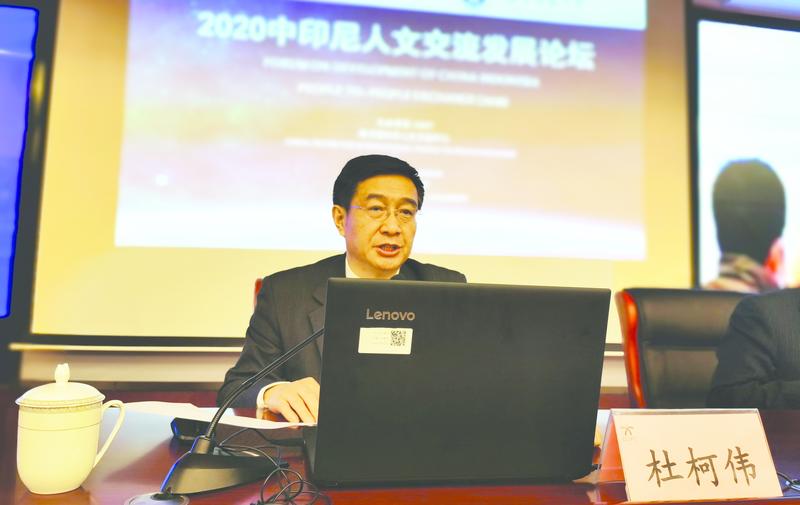 People-to-people exchange and heart-to-heart communication benefit all, says Du Kewei, director-general of the Chinese Ministry of Education’s China Center for International People-to-People Exchange (CCIPE), co-organizer of the forum. (LING MINGSHENG / FOR CHINA DAILY)
People-to-people exchange and heart-to-heart communication benefit all, says Du Kewei, director-general of the Chinese Ministry of Education’s China Center for International People-to-People Exchange (CCIPE), co-organizer of the forum. (LING MINGSHENG / FOR CHINA DAILY)
CCIPE Director-General Du Kewei said the mutual support from China and Indonesia during the pandemic has stimulated the development of the bilateral cooperation in people-to-people exchange, which is also conducive to mutual trust in politics, as well as trade and economic cooperation.
Noting the China-led Belt and Road Initiative can synergize with Indonesia’s Global Maritime Fulcrum vision, Du said this has led to higher standards for vocational education and talent cultivation for both countries.
People-to-people and cultural exchanges represent a concept that centers on the people, adopts open, equal, inclusive and mutual learning approaches, and aims at win-win cooperation, equitable justice and sustainable development, he said.
He expressed the hope that more people of skills could become messengers of such exchanges, so that the concept can be integrated into all aspects of cross-border comings and goings for common prosperity.
Zhu Yuhua, president of the Yellow River Conservancy Technical Institute, in Kaifeng, Central China’s Henan province, said: “Since 2012, more than 500 international students from 31 countries have studied at our institute, including 78 students from Indonesia.”
Due to the pandemic, all Indonesian students at the institute have returned to their homeland, but Zhu said the school has made every effort to ensure learning quality for these students by using online platforms and innovative technologies.
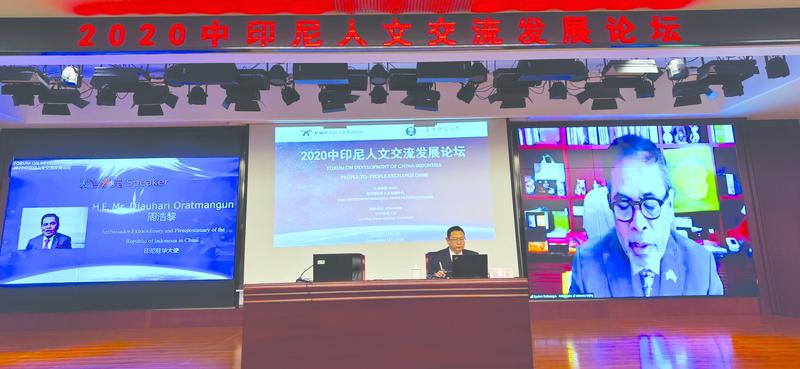 Djauhari Oratmangun, ambassador extraordinary and plenipotentiary of Indonesia in China, notes in his speech that bilateral relationship is also embodied by the friendship among their people, which has become increasingly close. (LING MINGSHENG / FOR CHINA DAILY)
Djauhari Oratmangun, ambassador extraordinary and plenipotentiary of Indonesia in China, notes in his speech that bilateral relationship is also embodied by the friendship among their people, which has become increasingly close. (LING MINGSHENG / FOR CHINA DAILY)
“Our school now offers a major in Chinese. We hope to strengthen the cooperation (with Chinese institutions) in training and exchange of lecturers and students,” said Johny Custer, director of the State Polytechnic of Bengkalis, a vocational education institution in Indonesia.
During presentation sessions, participants from both countries shared their insights on the China-Indonesia people-to-people exchange.
Fasli Jalal, rector of YARSI University in Jakarta, said there is a high demand in Chinese language training, in order to address the need for competence human resources managing bilateral trade and economic cooperation.
A case in point is that the number of people in Indonesia who have taken the HSK, the Chinese proficiency test, has risen significantly from 1,200 in 2001 to 140,316 in 2019, according to Fasli, who is the former vice-minister of Indonesia’s Ministry of Education.
Gao Zhiming, manager of the Public Relations Department at China Railway Group’s office in Indonesia, said the company has set up a training center at its Jakarta-Bandung high-speed railway project, a flagship BRI project, to improve the skills of local employees. It has also been working with Indonesian universities to provide internship opportunities for graduates.
READ MORE: Chinese and Indonesian biotech firms in vaccine collaboration
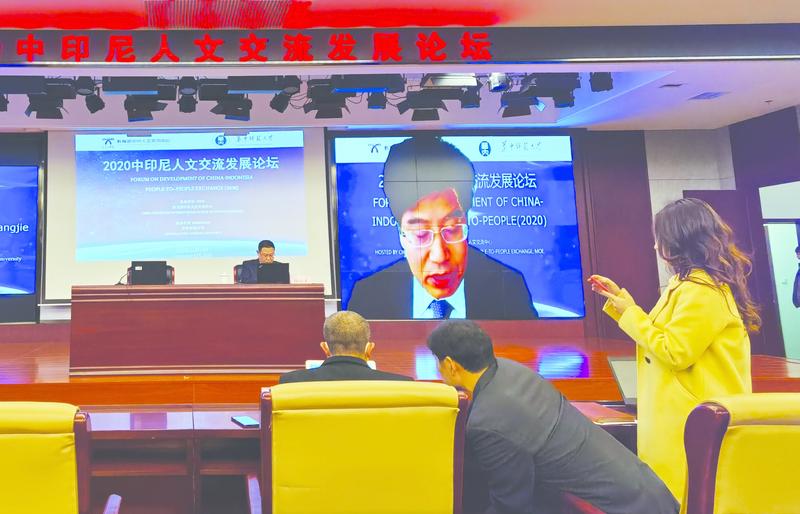 Local staff look closely at technological facilities to ensure smooth online proceedings during the address made by Peng Shuangjie, vice-president of Central China Normal University (CCNU), also the forum co-organizer. (LING MINGSHENG / FOR CHINA DAILY)
Local staff look closely at technological facilities to ensure smooth online proceedings during the address made by Peng Shuangjie, vice-president of Central China Normal University (CCNU), also the forum co-organizer. (LING MINGSHENG / FOR CHINA DAILY)
A book launch of Annual Report on China-Indonesia People-to-People Exchange Development (2020) was held during the forum.
Wei Hong, director of the Center for China-Indonesia People-to-People Exchange at CCNU, said the report examines the cooperation between China and Indonesia in different sectors, from education and healthcare to tourism and think tanks. By analyzing previous achievements and existing challenges, the report provides suggestions for future development.


